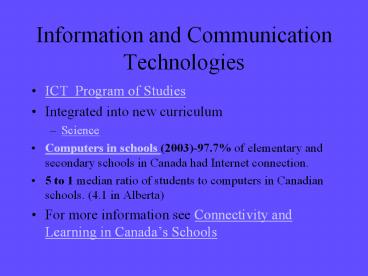Information and Communication Technologies - PowerPoint PPT Presentation
Title:
Information and Communication Technologies
Description:
Title: PowerPoint Presentation - Computer Technology in the Classroom Author: Secondary Education Last modified by: Norma Nocente Created Date – PowerPoint PPT presentation
Number of Views:70
Avg rating:3.0/5.0
Title: Information and Communication Technologies
1
Information and Communication Technologies
- ICT Program of Studies
- Integrated into new curriculum
- Science
- Computers in schools (2003)-97.7 of elementary
and secondary schools in Canada had Internet
connection. - 5 to 1 median ratio of students to computers in
Canadian schools. (4.1 in Alberta) - For more information see Connectivity and
Learning in Canadas Schools
2
Underutilized Technology
- While the technology is available in every
school, we see little evidence of it being used
in science classes. - This appears to be especially true when we look
at high schools - Technology use focuses more on digital resources
than cognitive tools.
3
Digital Resource versus Cognitive Tools
- Digital Resource
- computer available information source
containing facts, perspectives, or information on
a topic of interest. - E.g. NASA News
- Anatomy
- ESTAT
4
Cognitive Tool
- Resource presenting information specifically
tailored for particular learning goals on a
particular topic of interest for learning by a
particular target audience. - E.g. BioKIDS
- Virtual Solar System
- ESTAT Teacher Resource
- WebQuest
5
Learning Dimensions (page 483)
Learning Dimension Associated Technologies
Learners think critically about science ideas and/or compare with real life conditions Modeling, simulations, and visualization tools
Learners critically evaluate and communicate scientific ideas Online critique and discussion resources
Learners formulate knowledge such as scientific explanations from evidence Online scaffolding tools
Learners using appropriate tools to gather, analyze, and interpret data Computer-based collection and analysis
6
Another Definition of Cognitive Tools (Mindtools)
- Jonassen (1996)- Mindtools are computer
applications that require students to think in
meaningful ways in order to use the application
to represent what they know.
7
What kind of thinking is promoted?
- Critical Thinking
- Evaluating, analyzing, connecting
- Creative Thinking
- innovative thought, novel approach
- Reflective Thinking
- introspective, examines own values and beliefs
8
Appropriate Technology Integration
- based on the belief that the curriculum and the
needs of the learner determine the use of the
technology - requires pedagogical strategies that engage the
learner - takes advantage of the truly unique attributes of
the technology
9
Concept Mapping
10
Simulations/Models
- a constrained environment that allows learners to
test hypotheses - provides experiential learning
- allow the exploration of phenomena
- E.g Gizmos
- Science Education- Class Code- NCZNT4LPRL
- Jason Project
- learners can build their own models
- E.g. Stella
11
Internet Activities
- Blogging
- Nobel Intent
- Podcasts
- Current Science and Technology
- Virtual Exhibits
- Museum of Science - Boston
12
Data Collection Probes
- Vernier
- Pasco































